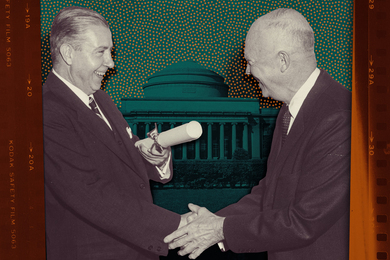MIT has established the MIT Industrial Performance Center which will develop educational and research programs aimed at understanding and improving industrial performance, both nationally and internationally.
The problems the center will address-productivity and competitive performance-are at the heart of the nation's current economic woes, said Professor Richard K. Lester, who will head the new undertaking.
Provost Mark S. Wrighton, who announced the establishment of the center and Professor Lester's appointment, said the strength of faculty and students from 12 MIT departments will be coordinated by the center.
"The concept of the Industrial Performance Center is a challenge to MIT's unique capabilities to help develop practical solutions to real problems of industrial performance through the combination of education and research," Professor Wrighton said.
Establishing the center implements one of the key recommendations of the MIT Commission on Industrial Productivity in its 1989 landmark book, Made in America. The commission urged that MIT establish a new interdepartmental center to continue and deepen the commission's study of competitive performance of firms, industries and national economies.
The director of the new center, Professor Lester, a member of the Department of Nuclear Engineering, served as the executive director of the MIT Commission and was one of the three principal authors-with Professors Michael L. Dertouzos and Robert M. Solow-of Made in America.
Professor Lester said the new MIT center's conception of industrial performance "will encompass productivity, quality, flexibility, new product and process development, human skills and mastery of productive processes, and command of strategic technologies."
In pursuing research and new educational initiatives through the center, faculty and students will use the operational model that proved successful in the Made in America study and go to the shops, laboratories and offices of industry in the United States and abroad.
"In this way, we expect to learn directly about current problems in these industries and new ways of organizing people and technologies within and among firms to solve these problems," Professor Lester said.
Other faculty members who have played key roles in the establishment of the new center include Professors Suzanne Berger (political science) H. Kent Bowen (materials science and engineering), John M. Deutch (chemistry), Thomas A. Kochan (management), Thomas L. Magnanti (management) and Michael J. Piore (economics), as well as Professors Dertouzos and Solow.
The founding sponsor of the MIT Industrial Performance Center is the Alfred P. Sloan Foundation of New York, which has recently undertaken a major effort to establish centers of learning about industry at several universities across the United States.
That effort, foundation president Ralph E. Gomory said when the program was announced, reflects the organization's belief that "Doing industry right, correctly, effectively is the key to whether our children live as well or better than we do. That`s why it is worth studying."
Professor Lester agrees. "For the best part of two decades, the real incomes of much of the American workforce have stagnated. The single most important reason for this has been the weak productivity performance of the US economy. Productivity growth in the US remains the slowest of all the major industrialized countries, and is a serious threat to the nation's future prosperity."
(As part of its industry program, the Sloan Foundation is also sponsoring research at MIT on the global automotive industry and the pharmaceutical industry.)
The subject of productivity and industrial competition cuts across many of the academic disciplines and research activities at MIT. The new center will emphasize activities whose breadth and organizational complexity make them difficult for academic departments and research centers to undertake on their own.
"Our goal is to create a new focus and sense of purpose for MIT as a whole, centering on the search for new and more productive combinations of technology, human resources, and the organizational patterns and practices that link them," Professor Lester said. "This task is both intellectually challenging and of great practical importance to the United States."
A key objective of the center is to create an educational environment in which MIT students can encounter real-world problems of industrial performance.
"Our purpose," Professor Lester said, "is not to create a new breed of interdisciplinary students, but rather to enrich the existing disciplines by finding new ways to expose our students to real-world problems of productivity and competitiveness in our curricula, and by providing them with new opportunities for gaining interdisciplinary research experience as an integral part of their academic programs. This will entail developing new educational resources that will give our students a deeper understanding of how different firms, different industries, and different national societies organize in different ways to solve problems of industrial performance."
A version of this article appeared in the January 15, 1992 issue of MIT Tech Talk (Volume 36, Number 17).





